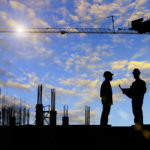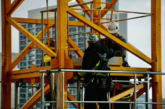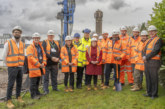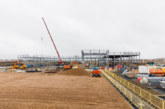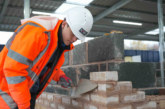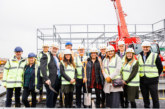As firms set out plans to return to work, national property, construction and infrastructure consultancy Pick Everard shares its advice for keeping staff safe on sites during the coronavirus pandemic.
Construction sites in the UK will be able to remain open during evenings and weekends to help the UK’s economy recover from the COVID-19 pandemic, according to government sources. In a move welcomed by Housing Secretary Robert Jenrick, several companies including housebuilders Taylor Wimpey and Persimmon announced last week their plans to ask staff back to work or re-open sites at limited capacity.
 James Hymers (left), Associate at Pick Everard, said: “Industry leaders are coming together to help companies find safe and practicable ways of working during this difficult period.”
James Hymers (left), Associate at Pick Everard, said: “Industry leaders are coming together to help companies find safe and practicable ways of working during this difficult period.”
Last week Health Secretary Matt Hancock revealed that he was not opposed to construction sites reopening, as long as staff abided by social distancing guidelines for health and safety amidst the COVID-19 pandemic.
James added: “The Construction Leadership Council (CLC) has created a set of site operation procedures to assist companies implementing a plan. The Health and Safety Executive (HSE) has also stated they will take enforcement action where employers are not taking reasonable steps to address social distancing.
“The public may still believe only key workers should be going out, so clients should be prepared for potential comments when returning to work. So long as the CLC guidance is followed, and clear measures that prevent transmission are in place, this should satisfy any enforcing authority responding to such public queries.
Site Operating Procedures
“The industry must take responsibility for ensuring site workers are kept safe and that health and safety arrangements on their sites remain suitable and sufficient. As well as managing the risk of transmission on site, employers must consider the commute to and from the workplace in line with current government advice. Employers should also consider protocol should someone fall ill on site — and what steps will be taken to prevent transmission both at work and before they return home to self-isolation.
“Where work cannot take place from home, social distancing guidelines should be adhered to. If this is not possible given the nature of a particular task, employers should ‘consider’ whether the works are necessary and if they are, implement measures to prevent transmission of the virus.
What if a site has to close?
“In addition to the site operating procedures, the CLC has produced guidance for where a construction site requires mothballing. While government guidance encourages sites to remain operational, this may not be possible due to issues with supply chain, workers being unwell or constraints to social distancing guidance amongst other issues.
“This may mean a site must close temporarily. In this instance, the Principal Contractor would still have a duty of care over the site, its visitors and anyone who might enter it illegally — as such, the site must be left clear and safe before it is closed. This may involve additional security measures being put in place, finishing essential works or implementing temporary safety measures to prevent injury to anyone who may trespass while it is not operational.
Taking a collaborative approach
“It is inevitable that there may be programme and cost implications associated with the measures that must be put in place to ensure that social distancing guidelines are adhered to — it may be necessary to defer certain aspects of a build until a full workforce can return or to temporarily stop while appropriate measures are implemented.
“A collaborative approach among the project team is therefore key. In planning effectively for changes to working practices and potential delays, recovery following the COVID-19 crisis can be accelerated.”
Header image ©jaruek/AdobeStock.

